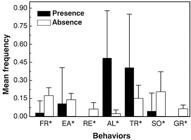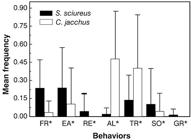The squirrel monkey Saimiri sciureus, an endemic primate of the Amazonian Basin, has been introduced in many localities of the Atlantic Forest biome. Introduced exotic species gain a competitive advantage in their new environment because of a lack of natural predators, competitors or diseases. This advantage can result in a reduction in the resources for the endemic species. The aims of this work were to evaluate the level of adaptation, and monitor the forms of interaction and the impact caused by S. sciureus on the behavior of the native species Callithrix jacchus in the Saltinho Biological Reserve, Tamandaré, Pernambuco, Brazil. The behavior was assessed by use of scan sampling method, every 5 min. A total of 382 h (191 h or 2,292 scans per group) of time sampling was performed. Sixteen interactions were recorded. The interaction index was low and represented 2.4% of the total observation time. Interactions were significantly higher during the dry season (58.5%) relative to the rainy season (41.5%). Callithrix jacchus was intolerant to the presence of S. sciureus and the last one was more tolerant during the interactions. In the presence of S. sciureus, C. jacchus eating, foraging, resting, socializing, and self-grooming behaviors were reduced while alertness was increased. Territorial behavior showed no significant difference. In the presence of S. sciureus, on average, the group of marmosets assembled at a higher layer of the forest stratum. The results might indicate a negative effect of S. sciureus on the native species, C. jacchus.

 Thumbnail
Thumbnail
 Thumbnail
Thumbnail



